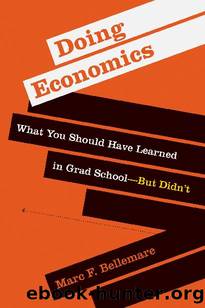Doing Economics by Marc F. Bellemare

Author:Marc F. Bellemare [Bellemare, Marc F.]
Language: eng
Format: epub
Publisher: MIT Press
Published: 2022-05-10T00:00:00+00:00
4.13 Publicizing after Publishing
Though the goal of every junior researcher is to get their papers accepted, one should take the long view and consider what matters in the long run. Yes, the quality of your articles and the journals theyâre published in as well as the quantity of publications you have all matter for the welfare of your career. Once your position in the profession is relatively secure (say, because you have tenure or have been promoted), however, what matters for the next step in your career more often than not has to do with your impact as a scholar.
For better or for worse, impact is nowadays measured in terms of the number of times your work is cited on the usual citation aggregatorsâgenerally, Google Scholar or Web of Science. Citation counts are especially useful when comparing scholarly impact between disciplines, or between fields within a certain discipline. And for all of their imperfectionsâfor instance, they do not account for quality of the source citing the work, nor do they account for whether the source citing the work is critical of itâthey remain the most democratic and objective measure of scholarly impact.
How do you ensure that your work receives the right amount of attention? Obviously, scholarly impact is heavily dependent on decisions made months if not years ahead of publication. Empirical articles that provide a credible finding about a policy question that is on peopleâs minds at the moment the article is published will tend to be more relevant than an umpteenth proof of Arrowâs impossibility theorem, no matter how simple the former, and no matter how elegant the latter.25
There are steps you can take, however, as late as right before an article goes to production if you want to increase its scholarly impact. The easiest of such ways is to go with a good title. Here, clear trumps clever, and the shorter your title, the better in terms of citations, it seems. Though their empirical methods would not be convincing to most economists, Letchford et al. (2015) discuss descriptive evidence according to which papers with shorter titles get cited more frequently.
Next, except for the really technical terms (e.g., dynamic stochastic general equilibrium model, regression discontinuity design), your abstract should be intelligible to a college-educated reader. Similarly, your introduction should be mostly intelligible to a college-educated reader. Having your title, abstract, and introduction (and perhaps your conclusion) intelligible to people outside your field, outside your discipline, and ideally outside of academia altogether can do wonders for your scholarly impact. As I mentioned in chapter 2, people âreadâ papers inspectionally, which means that if you want your work to have impact, the parts they read should be accessible to them. You can lead a horse to water, but you cannot make it drink. Nothing prevents you, however, from bringing water up to its mouth once you get to water!
One thing that often gets overlooked in terms of expected impact is search engine optimization (better known as SEO), which is about how search engine algorithms will look for keywords and organize searches as a result.
Download
This site does not store any files on its server. We only index and link to content provided by other sites. Please contact the content providers to delete copyright contents if any and email us, we'll remove relevant links or contents immediately.
Asking the Right Questions: A Guide to Critical Thinking by M. Neil Browne & Stuart M. Keeley(5765)
Autoboyography by Christina Lauren(5228)
Eat That Frog! by Brian Tracy(4527)
Dialogue by Robert McKee(4390)
Sticky Fingers by Joe Hagan(4190)
Journeys Out of the Body by Robert Monroe(3621)
Annapurna by Maurice Herzog(3464)
Full Circle by Michael Palin(3443)
Schaum's Quick Guide to Writing Great Short Stories by Margaret Lucke(3376)
Elements of Style 2017 by Richard De A'Morelli(3343)
The Art of Dramatic Writing: Its Basis in the Creative Interpretation of Human Motives by Egri Lajos(3063)
Atlas Obscura by Joshua Foer(2955)
Why I Write by George Orwell(2945)
The Fight by Norman Mailer(2930)
The Diviners by Libba Bray(2928)
In Patagonia by Bruce Chatwin(2922)
The Mental Game of Writing: How to Overcome Obstacles, Stay Creative and Productive, and Free Your Mind for Success by James Scott Bell(2906)
Venice by Jan Morris(2570)
The Elements of Style by William Strunk and E. B. White(2470)
